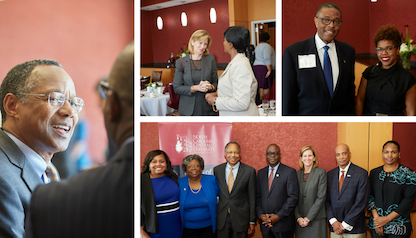
The partnership between Duke and North Carolina Central University (NCCU) will leverage the strengths of both institutions to advance translational science and improve health outcomes, particularly for those health issues that disproportionately impact underserved and underrepresented communities. The partnership began in September 2017 with a kick-off event attended by Chancellors Dr. A. Eugene Washington, Duke School of Medicine, and Dr. Johnson O. Akinleye, North Carolina Central University. Members from both universities developed plans for three core areas: workforce development, pilot projects, and community engagement.
The agreement is intended to “produce a partnership around developing careers in research,” said Duke Clinical and Translational Science Institute (CTSI) Director Dr. Ebony Boulware. “There are scientific strengths N.C. Central has that Duke doesn’t have. They’re complementary.”
Since the celebration, both Duke and NCCU have worked to develop a strategic plan for the first year of the recently renewed Clinical and Translational Science Award (CTSA) 3.0.
NCCU leads, Dr. Undi Hoffler and Dr. Jonathan Livingston, along with Carla Oldham, Betty Brown, Nataya Ford, Courtney Hart, and Kai Christopher, will collaborate with the CTSI Community Engaged Research Initiative leads, Dr. Rosa Gonzalez-Guarda and Dr. Schenita Randolph, along with Kenisha Bethea, Davon Washington, and Diane Willis, to develop four signature programs:
-
Ethno-dramas – Drama based education has been used around the world and in the United States to educate communities. NCCU will use this approach to increase awareness and knowledge about the prevention and treatment of specific diseases. From 2006 to 2009 NCCU successfully developed and produced dramas for the community to address prostate cancer, breast cancer, HIV, diabetes, and drug abuse. The ethno-drama plays were held at NCCU for two weekends in the summer with an attendance over 5,000. The ethno-drama plays won theatrical awards and were highlighted on the National Public Radio.
NCCU’s ethno-dramas are currently being developed. The project will use the resources and experience of both partner universities to extend beyond the Durham area. Research will be conducted to measure the effectiveness of using theater to promote discussion and participation in pro-health behaviors (i.e., cancer screenings, clinical trials) in rural and urban African-American communities, respectively. The first play will premiere in Durham during the summer of 2019 and tackle the issue of cervical cancer.
-
Research engagement tours/workshops- Designed to demystify scientific research and demonstrate its importance in one’s everyday experiences. The goal of the tours/workshops is to create an open environment in which members of the community and researchers can engage with each other. Through hands-on interactive workshops, community members will participate in the process of scientific discovery and gain a better understanding of the variety of research from basic to translational to clinical.
-
Community-led health equity conference- Community voices and perspectives will guide the content and format of this initiative. Community members will set the agenda for the engagement, and the Duke/NCCU partnership will assist in the organization and facilitation of the programming. The goal of the conference is to not only network and share information, but also to implement actions that will foster improved health outcomes, dispel or address feelings of mistrust with researchers and clinicians, as well as, inform policy that directly or indirectly impacts the sustainable health of underrepresented and underserved communities.
-
NCCU junior faculty and/or postdoctoral scholars program- Junior faculty and postdoctoral scholars conducting T1-T2 research at NCCU will be partnered with T3-T4 researchers at Duke to allow for greater understanding of how basic research discovery can contribute to better population health outcomes. Release time will be provided to junior faculty and/or postdoctoral scholars to assure focused effort for the conduct of a community engaged research pilot project and professional development.